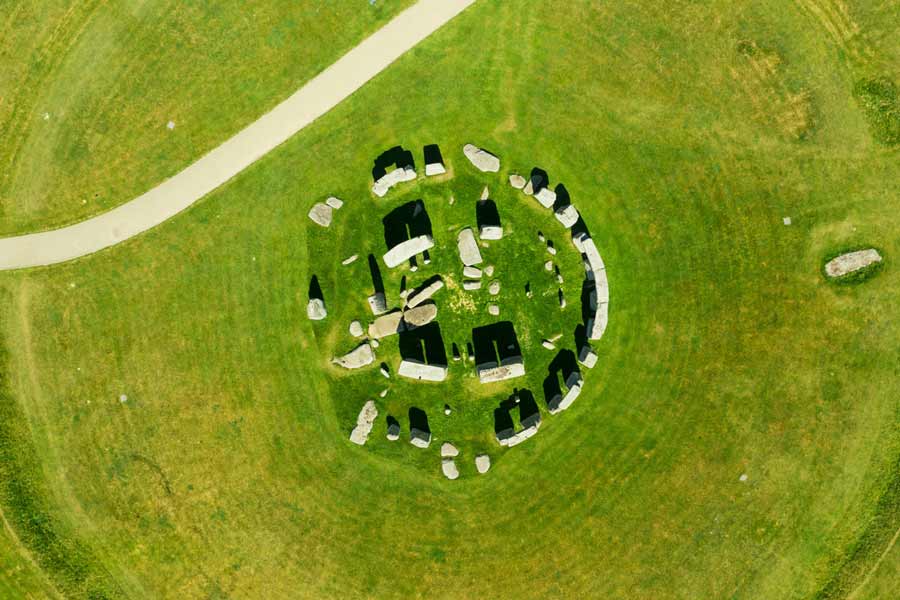Welsh Nationalists Want Stonehenge Bluestones Returned to Wales
A group of Welsh nationalists and a tourism leader have stated that if Greece is able to actively reclaim the controversial Elgin Marbles, then Wales should consider reclaiming the Stonehenge bluestones. A farm park owner, Lyn Jenkins claims Welsh people should take back the ancient bluestones of Stonehenge after 5,000 years in situ to create a new tourist attraction in Wales. Jenkins told the Daily Mail that if U.K. Prime Minister Boris Johnson does not agree to move the stones, “Welsh First Minister Mark Drakeford should send a bill for a few million pounds as compensation.”

A UCL study pinpointed the exact locations where 42 of the standing stones at Stonehenge, known as the Stonehenge bluestones, were quarried in the Preseli hills in Pembrokeshire 5,000 years ago. (UCL)
“Extremely Lucrative” Proposal: Returning Stonehenge Bluestones to Wales?
Owner of the Cardigan Island Coastal Farm Park, Lyn Jenkins was reported by the Mirror as claiming that the historic, and currently controversial, stone circle should be transported stone by massive stone from Salisbury Plain in England “back” to Wales. Furthermore, the farmer thinks the world heritage monument should be rebuilt in Wales “so it can become an attraction for millions of visitors.”
- Startling New Evidence Suggests Stonehenge was First Built in Wales then Transported and Reconstructed 500 Years Later in England
- The Where, When and How of Quarrying Stonehenge 'Bluestones' Is Revealed in New Report
The claim is based on the general consensus that some of the earliest stones used at the Stonehenge monument, the so-called bluestones, originated in Wales’ Preseli Hills of north Pembrokeshire at the famous Waun Mawn site. Sometime before the stones were rebuilt into the monument we see today, about 5,000 years ago they were transported 175-miles to their current location on Salisbury Plain.
Daring being accused of satisfying self-interest, Jenkins has announced that Welsh Heritage authorities needn't be stuck for a location to rebuild Stonehenge as he is offering them a plot on his Cardigan Island Coastal Farm Park in Gwbert, with the Preseli Hills in the background from where the stones originated. And if Boris Johnson decides not to approve the rather audacious petition, Jenkins suggests that the First Minister of Wales, Mark Drakeford, send Boris Johnson “a bill for a few million pounds.” After all, Stonehenge is an extremely lucrative tourist attraction.

Research has revealed that the Stonehenge bluestones first stood at Waun Mawn in Wales, seen here. If Stonehenge really is a “second-hand” monument, should it be returned back to Wales from England? (A. Stanford / Antiquity Publications Ltd.)
Opportunistic Proposition? Bananas? Or Is It?
In his statement which was reported in the Daily Mail, Jenkins pointed out that Boris Johnson “is a historian” and this means he knows that the 5,000-year-old Neolithic monolithic monument “was not received by the English, since they have only been in what is now England for a mere 1,500 years.” What’s more, he added: “The geological evidence proves that the bluestones at the center of Stonehenge are originally from the Preseli Hills.”
Now Welsh nationalists have set up a petition to return the stones to Preseli Hills in Wales. The spokesperson for the campaign, Iwan ap Dafydd, wrote that “the circumstances of the original removal event are impossible to determine, therefore, it would be prudent that they should be returned to their original location.” In support of his objective to repatriate the monolithic stones across the border, he explained that "the return of these stones will be an economic and social benefit to the people of Pembrokeshire and Wales."
Let’s be honest here. When you first read about the petition and discover it is being backed by Welsh Nationalists its easy to conclude that this idea is just an attention seeking play and it is not hard to conclude that the entire concept is clean bonkers for more reasons than I need write here. Another way to describe it is “bananas.” However, if we consider how Stonehenge is being currently treated with the new Stonehenge tunnel project being build beneath it, you have to wonder if the stone circle would live longer, and serve a stronger social function, if it was indeed moved to Wales.
- Brexit Reignites Greece’s Appeal to Return Stolen Parthenon Marbles
- US Charity Bought Hopi Masks for $530k Then Returned Them to Tribe
While we do have the technology to undertake such a task, it is not likely to happen anytime soon, for the simple reason that the grounds on which the petition have been made are almost comical. Just because a stone came from modern Wales, and today exists in modern England, when it was moved some 5,000 years ago a tribal leader perhaps only moved the monument from one corner of his estate to another.
Top image: Welsh nationalists claim that England should return the Stonehenge bluestones back to Wales. Source: anitalvdb / Adobe Stock
By Ashley Cowie




















Comments
The daily mail should have saved this one for April 1st.
The argument is even founded on a premis of the same caliber, the broken and fragmented marbles 'the Greeks want back' are in the british museum and are staying put, their claim to them as sound as the Welsh one here.
There is an underlying moral though which I think people generally miss: for us britts who won't be going to Greece or some obscure place in Wales to gaze upon some ancient relics of a deceased culture, there are perfectly good substitutes here, easier and cheaper to access. I wonder how many people visit these places after reading these articles and I wonder if that's their real design........... After people gratify themselves over the moral side of the story though of course, we wouldn't put the effort in visiting something without first establishing its rarity or significance now would we.
Welsh nationalists are selectively forgetting one thing. The giant sarsen stones, arguably the draw of the entire monument, are very much local to what is now England. Are they proposing taking these too? Or just the bits they want, in an environment where our modern political and national boundaries didn't exist, or at least in the same construct as we understand them now.
"Typically weighing 20 tonnes and standing up to 7 metres tall, sarsens form all fifteen stones of Stonehenge’s central horseshoe. This includes the uprights and lintels of the outer circle, as well as outlying stones such as the Heel Stone, the Slaughter Stone and the Station Stones." English Heritage.
The whole thing makes no sense….
1.There was no such thing as Wales or England 5000 years ago.
2.If the argument is that the stones were possibly removed without the consent of the people who originally constructed the monument in Wales, well how do we know the people who originally constructed the monument in Wales weren’t outsiders who invaded that area and built their monument there?
If it’s not about geo location or lineage of the people and it’s simply about the origin of the materials, in future do countries get to lay a claim to buildings in other countries because the steel was shipped from another country ?
When ancient Egyptian monuments were threatened by the Aswan Damn they were taken apart & moved to a safer location. So too Stonehendge is being threatened by modern construction. Yet it’s been discovered that there's far more physically to this 'Standing Stones’ complex than just the stones; the circle of pits, the great cause-way & the many ancient graves. The conditions under which why the Welsh ‘Blue’-stones were taken from their original location to the place of Stonhendge can only be known if we had a time-machine. There is no Time machine so we don't know if these blue-stones were taken with or without consent. The Blue-Stones should stay where they are & the modern world should work around this Sacred spot & not be disturbed by construction.